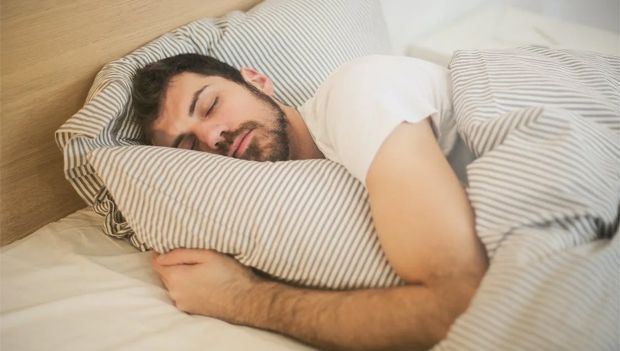
How to Be Healthy | Best All-Natural Soap | Best Natural Toothpaste | Best Organic Mattresses | Best Natural Laundry Detergent | Best All-Natural Deodorant | Best Natural Sleep Aids | Best Non-alcoholic Wine | Best Yoga Mats | Best Coffee Beans
Sleep is one of the most commonly neglected aspects of health. We tend to emphasize exercise and eating right, but without proper sleep, we may not see the benefits of our efforts in the gym and in the kitchen. For athletes and other active people, sleep is a major factor in exercise recovery.
Regular high-quality sleep contributes to a healthy metabolism and strong immune system. It also helps individuals manage stress and improve their moods. The brain is a major beneficiary, too, since consistent sleeping patterns are crucial for learning and memory.
For some, it is rare to have trouble sleeping at night. For others, falling asleep and staying asleep is a constant battle. A good mattress and healthy sleep habits can go a long way, but sometimes you need something to help you wind down. Although there are pharmaceuticals that can help you sleep better, many people prefer to avoid these since they can cause dependency and other side effects.
For those in search of more natural alternatives, the ACTIVE Reviews Team has compiled a list of the best natural sleep aids to help you get some shut-eye in 2023.
Why Trust Us?
The health and safety of ACTIVE’s readers is of the utmost importance to us. To ensure your well-being when consuming dietary supplements, the ACTIVE.com editorial team prioritizes products that are independently tested by a third party. We’ve consulted with a team of nutritionists and dieticians to ensure the products we feature are of the highest standard. This helps us create the most accurate, authentic review content for our readers.
Disclaimer: Exercise caution when ingesting supplements. Always make sure to consult with your doctor before ingesting a new supplement or pill. Weight-loss supplements are not a substitute for a balanced diet and regular exercise. Any supplements taken should be used in accordance with a healthy lifestyle. Any weight loss more than a pound per week over a long period of time is unusual and should be monitored by a doctor.
The Best Natural Sleep Aids - Our Top Picks
By clicking on the product links in this article, we may receive a commission fee at no cost to you, the reader. Sponsorships and affiliate commissions help support our research so we can help you find the best products. Read our full affiliate disclosure here.
- Chamomile Tea
- Melatonin
- Essential Oils
- Lavender
- Valerian
- CBD
- Warm Milk
- Magnesium
- Passionflower
- Glycine
Chamomile Tea
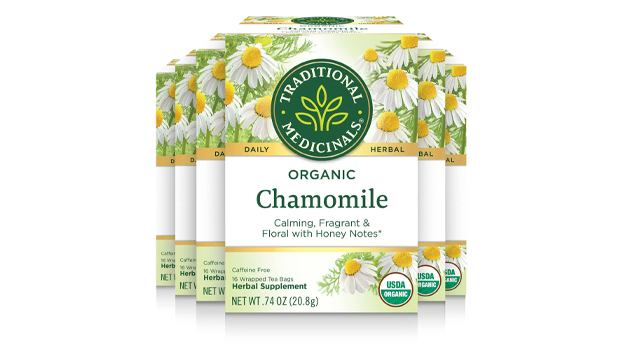
SPECS
- Serving size: 1-2 tea bags (brewed)
- Active ingredients: Chamomile
- Possible side effects: Nausea, dizziness, allergic reaction
Chamomile tea is an herbal tea made from the chamomile flower. It is effective in reducing anxiety and promoting restful sleep. Some people also use it to help treat an upset stomach. Chamomile is rich in flavonoids, which are compounds found in plants that can have beneficial effects on the body. One of the flavonoids it contains is called apigenin, which binds to benzodiazepine receptors in the brain to produce a mild sedative effect that aids in sleep.
This popular flower often comes in loose or bagged form, though it’s also available in capsules. To help promote restful sleep, most brands recommend brewing one chamomile tea bag in 6-8 ounces of water for 3-5 minutes. For double strength tea, just use two tea bags.
What We Like
- Can help users relax and get to sleep faster
- Widely available
- Cost effective
- All natural
What We Don't Like
- In rare cases, select users may experience side effects
- Drinking tea before bed may cause you to need to use the bathroom during the night
BUY: Chamomile Tea
Melatonin

SPECS
- Serving size: 1-5mg, to start
- Active ingredients: Melatonin
- Possible side effects: Dizziness, nausea, headaches, stomach cramps
Melatonin is an important hormone naturally secreted in the brain to help regulate sleep. It is one of the factors that helps guide your circadian rhythm, or sleep-wake cycle. As it gets dark outside, the body increases melatonin production, but stops it during the day. Often, people who work night shifts use melatonin to help them sleep during the day.
This hormone is widely available in supplement form and is most commonly found as a chewable tablet or pill. The recommended starting dose is 1-5 milligrams taken 30 minutes before sleep, though some people may need to take more to get the full effect. Melatonin supplements tend to be non-habit forming, making them suitable for regular use. That said, melatonin use among pregnant or nursing women is not recommended due to a lack of research.
What We Like
- Helps naturally regulate sleep cycle
- Non-habit forming
- Affordable
- Readily available
What We Don't Like
- Some users may experience drowsiness upon waking
- May require trial and error to get the dose right
BUY: Melatonin
Essential Oils
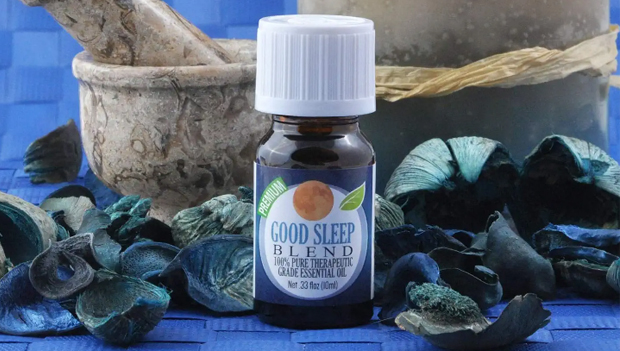
SPECS
- Serving size: N/A, not for consumption
- Active ingredients: Varies
- Possible side effects: Lightheadedness, skin irritation, allergic reaction
Essential oils are compounds extracted from plants. Many people use them to help their insomnia. While there are countless varieties, the most common essential oils for relaxation and sleep tend to be lavender, chamomile, valerian, bergamot, and sandalwood. Among these, lavender is the most popular due to its sedative and calming effects which can help improve sleep quality and duration.
Topical application and inhalation are the two most common ways people use essential oils. Research is fairly limited, but experts believe that inhalation of essential oils can cause the release of neurotransmitters in the brain that can promote an emotional or behavioral effect. In this case, that effect would be relaxation and sleepiness. Some essential oils can be ingested, though you'll want to carefully read the label before doing so.
What We Like
- Can help promote relaxation and sleep
- Cost effective
- Suitable to individual needs
- Naturally sourced
What We Don't Like
- Research on essential oils is limited
- May cause skin reaction for some users
BUY: Essential Oils
Lavender

SPECS
- Serving size: Variable
- Active ingredients: Lavender
- Possible side effects: Skin irritation, may cause headache when ingested orally, constipation, diarrhea
Lavender is an aromatic flowering plant that is part of the mint family. Its vibrant purple flowers make it popular in essential oils, teas, and other aromatics. This herbaceous plant is known for its anxiety-reducing and sedative properties and may aid in a better night's sleep. When used for aromatherapy or in a tea, lavender interacts with the neurotransmitter GABA to help reduce nervous system activity and restlessness.
To use lavender as a natural sleep aid, many people keep a sachet of lavender flowers on hand for convenient aromatherapy. Others rub a small amount of the essential on their wrist and inhale it. The flowers can be brewed as a tea, though this may cause potential side effects for some users.
What We Like
- Impacts neurotransmitters to help promote relaxation
- Easy to use
- Naturally sourced
- Economical
What We Don't Like
- May cause digestive side effects when ingested
- Research is limited
BUY: Lavender
Valerian
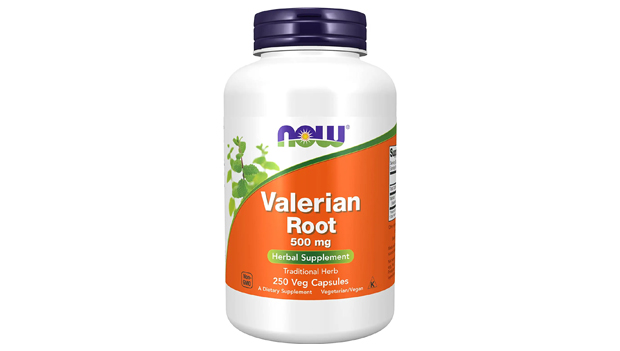
SPECS
- Serving size: Varies depending on form
- Active ingredients: Valerian
- Possible side effects: Drowsiness, upset stomach, vivid dreams
Valerian is a flowering plant commonly grown in Europe and Asia that's been used since ancient times for its health benefits. Its root is known for its anxiety-reducing and sedative effects when brewed in tea. While research is fairly limited, some studies suggest that the compounds found in valerian root can affect the neurotransmitters in the brain that help promote faster sleep onset and improve sleep quality.
Most people consume valerian root in a tea or concentrated capsule form. Some find its taste to be a bit too earthy or woody, so you may want to add a small amount of sweetener to offset this flavor. To help address insomnia, valerian root is typically taken one to two hours before bed and often takes a few weeks before the full effects emerge.
What We Like
- May help treat minor insomnia and anxiety
- Readily available in tea or capsule form
- Cost effective
- Naturally derived
What We Don't Like
- May take a few weeks to feel full effect
- The root has a strong smell and flavor
BUY: Valerian
CBD

SPECS
- Serving size: Varies depending on form
- Active ingredients: Cannabidiol
- Possible side effects: Drowsiness, dry mouth, lightheadedness, nausea
Cannabidiol, or CBD, is one of the active compounds in the cannabis plant and has been associated with a number of potential health benefits. Unlike THC, CBD is not psychoactive and does not cause the high associated with cannabis. A growing body of research suggests that regular CBD use may be linked to improvements in sleep quality and duration.
CBD interacts with cannabinoid receptors in the brain to help reduce cortisol (a stress hormone) to prompt faster sleep onset. This compound is available in a number of forms, including a smokable flower, gummies, oil, capsules, and topical balms. When using CBD for sleep-promoting purposes, it is best practice to consume it within 30-60 minutes before bed.
What We Like
- May help improve sleep quality and duration
- Available in a number of forms
- Research supported
- Readily available in stores or online
What We Don't Like
- Some users may experience drowsiness
- Some forms of it may be illegal in certain regions
BUY: CBD
Warm Milk
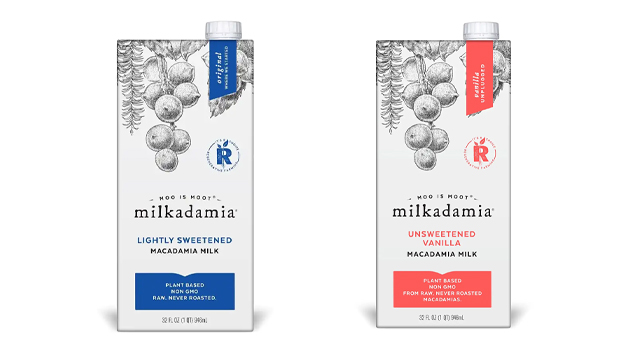
SPECS
- Serving size: 8-12 oz.
- Active ingredients: Tryptophan, casein tryptic hydrolysate
- Possible side effects: Lactose intolerance
Many people have heard the old wives' tale that drinking a glass of warm milk before bed can help you get to sleep more quickly. But is there any science to back it up? There is! Cow's milk contains an amino acid called tryptophan that can encourage melatonin production, a crucial regulator of the sleep-wake cycle. It also contains a compound called casein tryptic hydrolysate, a type of protein that has been shown to have potential stress relieving and sleep-promoting effects. These compounds absorb more effectively when the milk is at room temperature or warm.
To give this a try, drink a glass (8-12 ounces) of room temperature or slightly warmed milk within 30-45 minutes before bedtime. While this may not work for everyone, some people do report improved sleep after trying this natural sleep aid.
What We Like
- May help improve sleep onset
- Widely available
- Low risk of side effects
- Very affordable
What We Don't Like
- Some people may be lactose intolerant
- More research is needed
BUY: Warm Milk
Magnesium

SPECS
- Serving size: 250-450mg
- Active ingredients: Magnesium
- Possible side effects: Diarrhea, stomach cramps, nausea
Magnesium is an important mineral that serves numerous functions in the body, including supporting restful sleep. Regular magnesium intake can encourage GABA production, a neurotransmitter responsible for promoting relaxation and sleepiness. When you are low in magnesium, your body may not be able to produce sufficient GABA, potentially causing sleep disruptions.
To correct low magnesium levels and promote sleep, consider supplementing your diet with 250-450 milligrams of a high quality magnesium before bed. Magnesium glycinate or chloride tend to be the most easily absorbable forms. Other forms of magnesium are used as laxatives, so you'll want to do your research before supplementing.
What We Like
- Helps support relaxation and reduce anxiety
- Provides other potential health benefits
- Supplements are quite affordable
- Available in a number of forms
What We Don't Like
- Some forms of magnesium can have a laxative effect
- May not help you sleep if your magnesium levels aren't low
BUY: Magnesium
Passionflower

SPECS
- Serving size: 8 oz. of brewed tea
- Active ingredients: Passionflower
- Possible side effects: nausea, vomiting, drowsiness
Passionflower is a fast-growing vine native to the southeastern part of the U.S. and central South America. Common uses for it include treating insomnia and anxiety. While research is fairly limited, some studies suggest that it works by increasing GABA levels in the brain. It may also help reduce feelings of anxiety that can prevent you from getting to sleep.
Passionflower is typically found in tea, capsule, or tincture form. For a good night's sleep, try drinking a cup of passionflower tea 30 minutes before bed. A spoonful of honey complements the tea well.
What We Like
- Naturally increases GABA levels
- Available in different forms
- Naturally sourced
- Affordable
What We Don't Like
- Some users may experience unpleasant side effects
- Has an earthy taste that may be off putting to some
BUY: Passionflower
Glycine
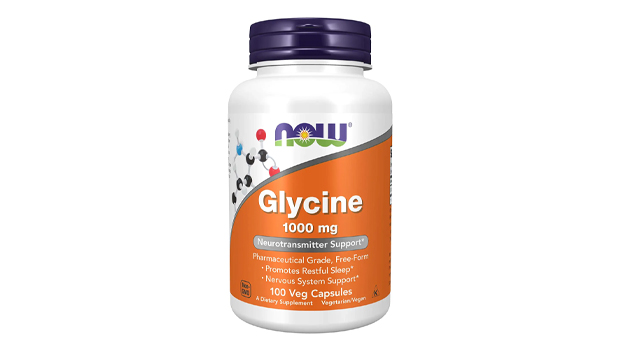
SPECS
- Serving size: 3-5g before bed
- Active ingredients: Glycine
- Possible side effects: Nausea, vomiting, upset stomach, drowsiness
Glycine is an amino acid naturally found in protein-rich foods like meat, eggs, soybeans, legumes, and dairy products. One of its important functions in the body is to serve as a neurotransmitter, or chemical messenger. When taken as a dietary supplement, some research shows that glycine can improve sleep quality.
This amino acid is readily available in powder or capsule form with a recommended dosage of 3-5 grams before bed to promote sleep. It's generally flavorless, though some find it slightly sweet. It can be added to most beverages without significantly affecting the taste.
What We Like
- Can help improve sleep quality
- Backed by science
- Naturally found in many of the foods we eat
- Flavorless
What We Don't Like
- Some users may experience digestive issues
- Slightly more expensive that some other natural sleep aids
BUY: Glycine
Risks of Sleep Aids
There are always some potential risks when taking supplements, and sleep aids are no different. Although these are naturally sourced, certain people may experience negative side effects when taking them. Here are the most common risks associated with sleep aids:
- Drowsiness: Sleep aids affect the nervous system, so some may leave you feeling slightly drowsy when you wake up.
- Digestive issues: Certain sleep aids may cause nausea, gas, diarrhea, and constipation.
- Allergic reaction: In rare cases, natural sleep aids may cause allergic reactions. Be sure you fully read the ingredient panel if you have allergies.
- Dependency: Although most natural sleep aids are non-habit forming, you may become dependent on them to fall asleep, especially with regular use.
FAQs About Natural Sleep Aids
What vitamins or minerals make you sleepy?
While no vitamins or minerals have been shown to directly make you sleepy when consumed, some can help promote restful sleep, especially when correcting a deficiency. These include magnesium, calcium, vitamin D, and B-vitamins. Getting these vitamin levels in check can help support high-quality sleep.
Who should not take melatonin?
While melatonin is quite safe for most people, there are a few populations that should avoid taking it. These include pregnant or nursing women, those with an autoimmune disease, and those taking certain medications. If you fall within these categories you'll want to check with your doctor before supplementing.
Is it okay to take melatonin every night?
Considering that melatonin naturally occurs in the body, it can be safely used by most people on a regular basis. It has a low risk of dependence, making it okay to take every night. You'll want to choose the lowest effective dose to avoid any potential side effects. Some people reserve melatonin for times when they struggle to fall asleep.
What can I take naturally for insomnia?
The most effective options are likely melatonin, chamomile, valerian, passionflower, and glycine. These all have at least preliminary evidence to suggest they can help support deeper and more restful sleep.
What can I drink to fall asleep fast?
When it comes to beverages that can help with sleep onset, teas are at the top of the list. A cup of chamomile, lavender, or valerian root tea can help bring about a feeling of sleepiness.
What foods naturally contain melatonin?
Foods that are naturally high in melatonin include milk, pistachios, tart cherries, fatty fish, oats, mushrooms, and bananas.
How to Be Healthy | Best All-Natural Soap | Best Natural Toothpaste | Best Organic Mattresses | Best Natural Laundry Detergent | Best All-Natural Deodorant | Best Natural Sleep Aids | Best Non-alcoholic Wine | Best Yoga Mats | Best Coffee Beans


